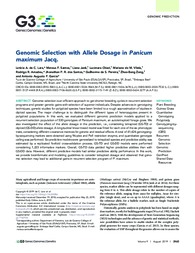Genomic Selection with Allele Dosage in Panicum maximum Jacq.
Genomic Selection with Allele Dosage in Panicum maximum Jacq.
Author(s): LARA, L. A. de C.; SANTOS, M. F.; JANK, L.; CHIARI, L.; VILELA, M. de M.; AMADEU, R. R.; SANTOS, J. P. R. dos; SILVA, F. G. da; ZENG, Z.-B.; GARCIA, A. A. F.
Summary: Genomic selection is an efficient approach to get shorter breeding cycles in recurrent selection programs and greater genetic gains with selection of superior individuals. Despite advances in genotyping techniques, genetic studies for polyploid species have been limited to a rough approximation of studies in diploid species. The major challenge is to distinguish the different types of heterozygotes present in polyploid populations. In this work, we evaluated different genomic prediction models applied to a recurrent selection population of 530 genotypes of Panicum maximum, an autotetraploid forage grass. We ,also investigated the effect of the allele dosage in the prediction, i.e., considering tetraploid (GS-TD) or diploid (GS-DD) allele dosage. A longitudinal linear mixed model was fitted for each one of the six phenotypic traits, considering different covariance matrices for genetic and residual effects. A total of 41,424 genotypingby- sequencing markers were obtained using 96-plex and Pst1 restriction enzyme, and quantitative genotype calling was performed. Six predictive models were generalized to tetraploid species and predictive ability was estimated by a replicated fivefold cross-validation process. GS-TD and GS-DD models were performed considering 1,223 informative markers. Overall, GS-TD data yielded higher predictive abilities than with GS-DD data. However, different predictive models had similar predictive ability performance. In this work, we provide bioinformatic and modeling guidelines to consider tetraploid dosage and observed that genomic selection may lead to additional gains in recurrent selection program of P. maximum.
Publication year: 2019
Types of publication: Journal article
Unit: Embrapa Beef Cattle
Keywords: Genomics, Genotyping, Guinea, Plant breeding, Polyploidy, Prediction
Observation
Some of Embrapa's publications are published as ePub files. To read them, use or download one of the following free software options to your computer or mobile device. Android: Google Play Books; IOS: iBooks; Windows and Linux: Calibre.
Access other publications
Access the Agricultural Research Database (BDPA) to consult Embrapa's full library collection and records.
Visit Embrapa Bookstore to purchase books and other publications sold by Embrapa.

